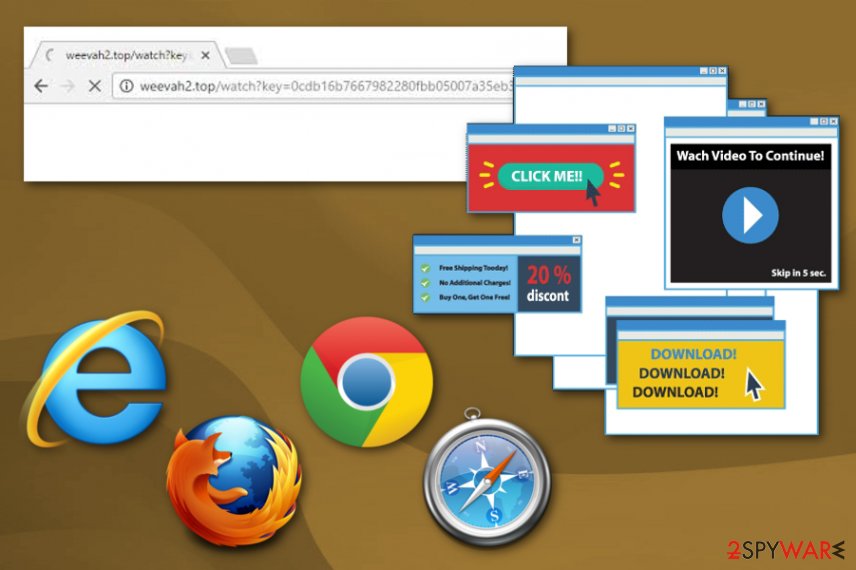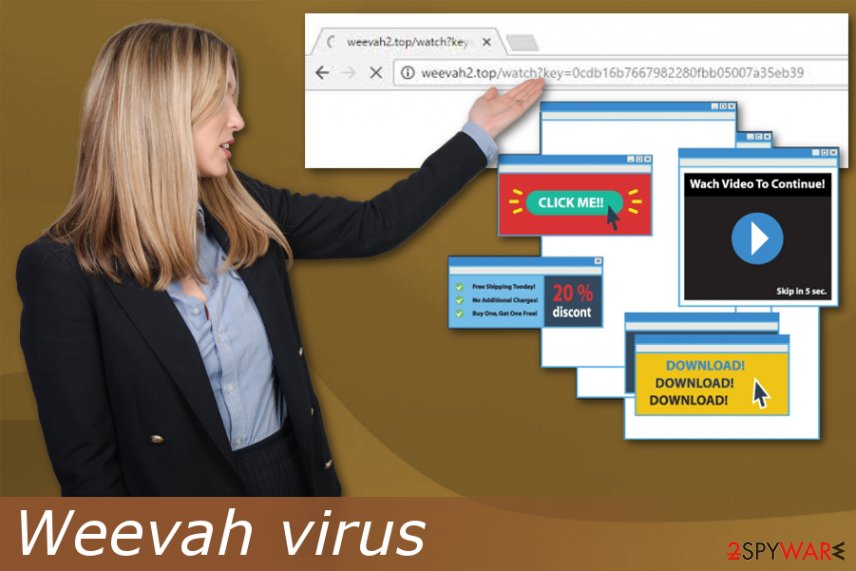Weevah virus is a potentially unwanted application that redirects users to weevah2.top and similar ad-filled sites


Weevah virus is a potentially unwanted program that causes constant redirects to Weevah2.top, launchpage.org, or other sites that might seem unfamiliar for you. The main purpose of the browser hijacker is to deliver pop-ups, in-text links, redirects, banners, coupons, and other commercial content to benefit financially via the pay-per-click[1] scheme.
In most cases, users get infected with Weevah or Weevah2 virus unintentionally during the installation of freeware/shareware apps downloaded from third-party websites. Alternatively, many may have installed the app after being tricked by a fake update, attractive ad, or intentionally without knowing much about the hijacker’s functionality and the impact on daily browsing activities. While browser hijackers like Weevah are not considered to be a major threat, its presence might relate to privacy issues and even malware infections.
| Name | Weevah virus |
|---|---|
| Type | Browser hijacker |
| Category | Potentially unwanted program |
| Symptoms | Delivers intrusive content, redirects to questionable sites, promotes fake tools and software |
| main sites promoted | Launchpage.org, Weevah2.top |
| Distribution | While in some cases users install PUPs intentionally without knowing much about apps’ operation, usually the infiltration occurs during the installation of freeware or shareware downloaded from third-party websites |
| Elimination | You can follow manual elimination guide as explained below or employ anti-malware tool which is capable of detecting potentially unwanted programs |
| Optimization | If you found malware on your computer, we recommend scanning it with repair software Reimage Reimage Cleaner Intego to fix damaged system files |
Weevah virus has been spreading for several years now, and it seems that it is still actively affecting users’ computers. For this reason, many are asking what is weevah2.top and why it is showing up on the browser so frequently. As mentioned above, the hijack occurs due to the installation of a potentially unwanted program, and since users rarely notice its infiltration, the post-infection activities (ads, redirects, browsers slowdowns) often come as a surprise.
If your browser delivers messages about Weevah2.top not uploading or connecting to Weevah2.top status, you have this hijacker on your device. Additional symptoms of the unwanted program:
- you are interrupted by advertisements which are injected into your favorite web pages;
- you continuously see banners, pop-up windows and different content promoting never-seen software;
- text on pages randomly turns into hyperlinks;
- unwanted extensions, tools or bookmarks are added to your browser without your knowledge.
Another fact that is not known for people infected with Weevah2 virus is its ability to initiate a silent data tracking that allows its developers to know your IP address, location, search queries, most visited sites and other online browsing preferences. This information can be used to create more personalized ads, but it can also be sold to unfair third parties seeking to misuse it for malicious deeds.
These are the main characteristics of the browser hijacker, and you should consider the elimination immediately after noticing any of this. The more time you give for the virus, the more changes to your browser or device, in general, it can make. You can remove Weevah virus by uninstalling related tools or programs and cleaning the system with your antivirus.
Also, you can proceed with Weevah virus removal with your anti-virus software and then fix the virus damage with tools like Reimage Reimage Cleaner Intego. Scan the system to see if there is any malware and clean the device thoroughly. Since there is a possibility, you have additional PUPs[2] this full system scan improves the performance of your device.

Weevah virus is a potentially unwanted program that has been redirecting to Weevah2.top, Launchpage.org and other questionable domains.

Weevah virus is a potentially unwanted program that has been redirecting to Weevah2.top, Launchpage.org and other questionable domains.
Freeware installer includes additional installs
You should always pay more attention when installing software and applications. Researchers[3] advise choosing reputable sources for your software and updates to avoid potentially unwanted programs. However, people still tend to use p2p networks and get their programs from questionable sources.
This option and a habit of skipping through steps during installations keep you at high-risk of getting cyber intruders on the system without consent. During freeware installations, there is an option to take Advanced or Default route. If you choose the Quick/Default installation, you agree to everything, and that include additional programs like adware or browser hijacker.
Opting for Advanced or Custom installations allows you to de-select unwanted applications and control what you are getting. Unfortunately, if you already got unwanted programs on your device, employ trustworthy anti-malware and get rid of them.
For Weevah virus removal, you should choose a reputable program
To remove Weevah virus properly and clean the system further, you should use anti-malware software. We have a few suggestions below, but you can use any tool of your choice. However, choosing a trustworthy tool can improve the whole virus elimination process and will give you better results.
However, for a full Weevah virus removal, you can also follow the steps provided by our experts. Note that it is essential to follow every step in the instruction given below carefully because you can get rid of needed system components and applications. Of course, scanning the system thoroughly is also recommended as it is the easiest way to make sure that there are no threats running in the background.
You may remove virus damage with a help of Reimage Reimage Cleaner Intego. SpyHunter 5Combo Cleaner and Malwarebytes are recommended to detect potentially unwanted programs and viruses with all their files and registry entries that are related to them.

